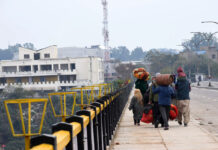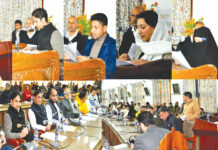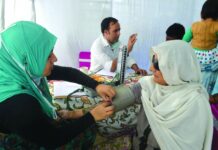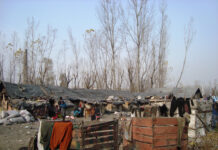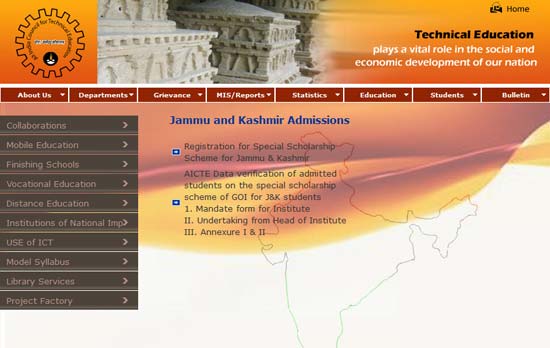For the houseboat owners in Dal Lake, tourists are business and hope. But sometimes tourists not just take along memories, they take away people too. Shazia Yousuf talks to a few families who lost their loved ones to love.
At least a dozen families living in houseboats in Dal Lake, associated with tourism, lost their male members to tourists they had hosted. Most of those young and illiterate tourist guides. These guests didn’t only take memories along but people too.
Thirty three years is a long time and apparently longer when those pass waiting for loved ones. Three decades of wait has turned Aisha’s eyes dry and face expressionless. On hearing her husband’s name from a stranger, Aisha’s blank face gleams and she breaks the silence, “gatchea kenh (is there any hope?).”
Aisha was 18 and her husband Abdul Rashid Mir 20, when he left with a tourist girl from Australia. The year was 1977. Since then Aisha has been waiting for his return, though the family is not sure whether Rashid is dead or alive. “This hope turned me into a wingless bird,” Aisha says.
It was 1975 when Aisha (16 then) was married to her cousin Abdul Rashid Mir (18). Rashid, eldest among nine siblings, was illiterate and ran a carpet business.
“Ours was a poor family, my father had died when I was five. We were three sisters living with our ailing mother. We had no brother. My mother was overwhelmed when Rashid’s family approached us with the marriage proposal,” recalls Aisha.
A year after the marriage, their son Abrar was born. However, a year later an Australian tourist Laura stayed in their houseboat with whom Rashid fell in love.
“Rashid was a loving husband. He told me that she (Laura) likes his honesty and loves to talk with him in our houseboat but when the truth surfaced, they had already married in court,” recalls Aisha.
Aisha’s uncle had gone to the houseboat and talked to Laura, who confirmed that they had married. “He came and told my father-in-law that Rashid has married, but we couldn’t believe it. Rashid was behaving even better than before,” says Aisha.
However, this love and concern they were pinning their hopes on didn’t last long. Soon Rashid started returning home late or leaving home in the middle of the night when the family was asleep. When Aisha revealed it to his parents Rashid confessed about his marriage with the girl.
“He accepted but promised to his father that he will not betray me. My father-in-law trusted him and insisted my staying with them. After some months Rashid came with some documents and asked for my signatures. I never knew he was planning to leave. Some days later he said he is going to Delhi and fled with the girl,” Aisha says. That was the last time they saw him.
Aisha didn’t marry again. She had a son to bring up, which she did by doing Tilla work on shawls. “My son had already lost his father; I did not want him to lose rest of his family. Nobody asked my opinion when Rashid left, when my father-in-law asked me to stay I didn’t complain either,” she says.
The family came to know about Rashid’s whereabouts through his daughter Zareena whom they contacted via internet.
Rashid’s nephew Ishfaq exchanged some emails with Rashid’s daughter. He says, “Zareena, 23, and her brother Imran, 20, were living with their mother. Laura had divorced uncle and they did not know where he was.”
After over three decades Aisha looks old and tired. Rashid’s parents have died and all younger siblings have married. Abrar is 34 and jobless.
Rashid lives in Aisha’s memories. The only letter he sent since he left, hangs framed on the wall. The letter reads 1988. Rashid also made a telephone call in 1994. “His father sacrificed a lamb that day. That was the moment of celebration for all of us,” says Aisha.
Asking her to repeat the same story doesn’t annoy Aisha, rather she sees hope in it. “May be the time has come. I know he will come one day. And all his sins will be forgiven with his arrival,” says the optimistic Aisha.
Sixty year old Khadija has a similar tale to tell with the only difference that she waits for her son. Living in a single storey house in Gulshan colony Dal Lake, Khadija raised her eight children including six daughters single handedly after the death of her husband Ghulam Mohammad Guru.
After many years of struggle Khadija pinned hopes on her elder son Abdul Majeed, who started working as a labourer at the age of 11. While lending a helping hand to her mother, Majeed lost his left eye. “He attempted to lift a heavy log of wood and fell on the ground where a piece of metal pierced his eye,” Khadija says with tears in her eyes. “When I remember my chest aches. My heart goes out for my child. He wasn’t always like this.”
With Majeed’s help Khadija was able to feed her family and married off her two elder daughters. “I was planning his marriage when Majeed said he wants to go to Goa and start some business of his own,” recalls Khadija.
In 1991 Majeed, 28 then, went to Goa where he met an Australian girl Sharne. “He came and said he wants to marry her. I told him that she will take you along, don’t marry her but he didn’t listen,” Khadija says.
Khadija preferred her son’s wish over her own apprehensions. The family got Majeed and Sharne married in a traditional Kashmiri Muslim way. The joy, however, didn’t last long. After two months of stay with Majeed’s family, Sharne insisted on going back to her house in Australia. And the couple left.
For 17 years the family didn’t get a single phone call from him. The hope of their return had almost faded away when two years back a neighbour who had gone to Australia on a business trip managed to get his contact number.
Majeed, and hopes of his arrival, took new birth, “We called him the movement we received the number. First he attended the call, when he recognised our voice he disconnected. We tried from different phone numbers but he wouldn’t attend any call,” says his niece Shagufta.
It was after months of struggle that Khadija was able to hear from her son. The family came to know about Majeed’s ordeal.
“They had stayed together only for a year. She had left him and took their two month old daughter Ikhlas along and married a Pakistani. He was living alone and working as a labourer. He went into drugs and depression and was jailed. He sent us his photograph. He had lost a lot of weight,” says Khadija while pointing to Majeed’s photograph – the only adornment of her mud walled house.
Khadija lives for her last wish, “I have a longing for him. I want to see him when I die.” But sense of guilt and failure doesn’t allow Majeed to return home, she adds. A couple of times when his younger sisters were getting married, he gave them “false hopes” of his return but didn’t. “We decorated his room and cooked delicacies for him. But he didn’t come,” says Khadija.
She remembers the last time she talked to her son, “Years should become months and months a day. Life is too long,” he had said.
Though women like Khadija and Aisha wait for the return of their loved ones, there are some men who have no one to return to. Such families have learnt and got used to living without them. “His mother isn’t alive to wait for him,” says father of Mohammad Shafi Mir.
Mohammad Shafi Mir, another young unmarried tourist guide left valley 18 years back with a foreigner leaving behind his ailing parents and two unmarried sisters. “He left us when some foreigner girl came. It was long back. He never called since then, we don’t know where he lives,” says his ailing father who seems to have forgotten his relation with Shafi.
Nobody in Shafi’s family seems hopeful of his return. Those who knew him have forgotten him and those who can search for him have never seen him. “His sisters needed him then but now they are married and happy with their families. His nephews and nieces don’t know him, his mother is dead,” says his father. “I don’t think Shafi will ever come back. But at times, I miss him badly,” he adds.
Besides the dilemma, these families they also have to put a brave face in society.
When Showkat Ahmad Bhat’s younger brother, Aijaz Ahmad Bhat is asked about the whereabouts of his brother he quickly answers, “He calls every day.”
However, his cousin says, “I know he has never called and he will not. At times truth is too bitter to admit.”
Showkat Ahmad Bhat went to Goa in 2001 with an American tourist who later took him to her place. The family doesn’t know where he lives and with whom. They don’t know whether he is single or has married. Nine years have passed, three of his five siblings have got married, “Though there are no signs of his return, our mother wants him to get married first,” says Aijaz.


